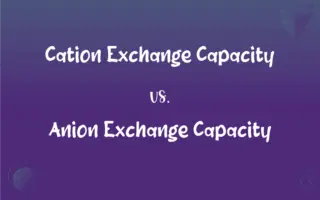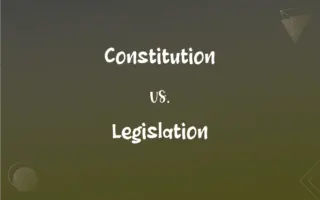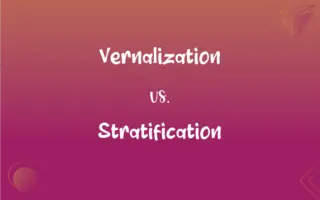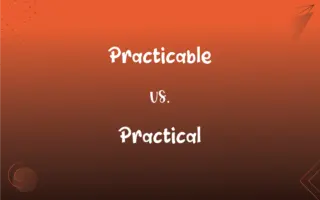Mortgage vs. Charge: What's the Difference?
Edited by Aimie Carlson || By Harlon Moss || Updated on October 19, 2023
A mortgage is a loan secured by real property, while a charge refers to the security interest over assets to secure a debt.

Key Differences
A mortgage is a specific type of loan arrangement where the borrower offers real property as collateral to secure the loan. In this arrangement, if the borrower defaults, the lender can take possession of the property through a legal process known as foreclosure. Thus, the essence of a mortgage is both the loan and the security on that loan, which is the mortgaged property itself.
Charge, in the context of finance and assets, pertains to the security interest or claim a lender has over a borrower's assets or property to secure the repayment of a debt. Unlike a mortgage which is specific to real property, a charge can be over various kinds of assets, including intangible ones. This means that a company might grant a charge over its machinery, accounts receivable, or even intellectual property to secure a loan.
The term "mortgage" is often associated with real estate, where an individual or business obtains a loan to purchase property. The property acts as collateral until the loan is paid off. If the borrower fails to make timely payments, the lender can claim the property to recover the owed amount. On the other hand, the term "charge" is broader and can relate to both real and personal property, depending on the terms of the agreement.
While both mortgage and charge serve as mechanisms to provide lenders with security for the money they lend, their application and scope differ. A mortgage is generally more structured and involves specific rights and obligations for both parties, such as interest rates, payment terms, and foreclosure rights. In contrast, a charge can be seen as a more general claim or lien over assets, which can be enforced if the borrower defaults.
Comparison Chart
Nature
Specific loan using real property as collateral.
Security interest or claim over assets.
ADVERTISEMENT
Applicability
Typically applies to real estate.
Can apply to both real and personal property.
Legal Recourse
Lenders can initiate foreclosure.
Lenders can enforce the charge and sell the asset.
Scope
Restricted to real property.
Broad, includes tangible and intangible assets.
Formalities
Typically requires registration and detailed agreements.
Might require registration, depending on the jurisdiction.
Mortgage and Charge Definitions
Mortgage
A loan secured by real property.
Jane took out a mortgage to buy her dream home.
ADVERTISEMENT
Charge
A security interest over assets.
The company granted a charge over its machinery to the bank.
Mortgage
A claim on property to secure debt repayment.
The bank holds a mortgage on the property until the loan is fully paid.
Charge
A claim by a creditor on debtor's assets.
There's a charge on this property, which needs settling before sale.
Mortgage
A legal agreement dictating terms of a property-backed loan.
The mortgage agreement specified a 30-year repayment term.
Charge
A lien securing payment of a debt.
The lender placed a charge on the company's accounts receivable.
Mortgage
An encumbrance on property for securing a loan.
The property has two mortgages against it, totaling $500,000.
Charge
An encumbrance to guarantee debt fulfillment.
As part of the loan terms, a charge was placed on the intellectual property.
Mortgage
A conveyance of property as security for debt.
They provided their house as a mortgage for the business loan.
Charge
A right established by a creditor over a debtor's property.
To secure the loan, a charge was created on the borrower's inventory.
Mortgage
A loan for the purchase of real property, secured by a lien on the property.
Charge
To impose a duty, responsibility, or obligation on
Charged him with the task of watching the young swimmers.
Mortgage
The document specifying the terms and conditions of the repayment of such a loan.
Charge
To instruct or urge authoritatively; command
Charged her not to reveal the source of information.
FAQs
What happens if someone defaults on their mortgage payments?
If someone defaults on mortgage payments, the lender can initiate foreclosure on the property.
How does a charge secure a lender's interest?
A charge provides a lender with a security interest or claim over a borrower's assets.
Can a charge be placed on intangible assets?
Yes, a charge can be placed on both tangible and intangible assets.
Is a mortgage applicable only to residential properties?
No, mortgages can apply to both residential and commercial properties.
What's the primary difference between a mortgage and a charge?
A mortgage is specific to real property, while a charge can be over any asset.
Who holds the title in a mortgage arrangement?
The borrower usually holds the title, but the lender has a claim until the loan is repaid.
What's a fixed-rate mortgage?
It's a mortgage with an interest rate that remains constant throughout its term.
How is the value of the asset under a charge determined?
It's determined by a valuation, market conditions, and the asset's nature.
Can multiple charges exist on a single asset?
Yes, multiple charges can be placed on a single asset based on different debts.
Is registration mandatory for both mortgages and charges?
While mortgages typically require registration, charges might, depending on the jurisdiction.
Can a property have both a mortgage and a charge?
Yes, a property can have both, but the terms of each agreement would dictate priorities.
Can a mortgage be refinanced?
Yes, a mortgage can be refinanced to change its terms or take advantage of lower interest rates.
What is the primary function of a mortgage?
A mortgage primarily functions as a loan secured by real property.
What's the role of equity in a mortgage?
Equity represents the property's value minus the outstanding mortgage balance.
What's a second mortgage?
It's an additional loan on a property that already has a mortgage, usually ranking after the first.
Can a charge be removed?
Yes, once the debt is settled or with mutual agreement, a charge can be removed.
Can a charge be transferred?
Yes, a charge can be transferred or assigned with the consent of both parties.
Does a charge always involve a physical asset?
No, a charge can also be over intangible assets like intellectual property.
Can a charge be negative?
In financial terms, a charge represents a claim or security interest, not a negative or positive value.
How do interest rates affect mortgages?
Interest rates determine the cost of borrowing and can influence monthly mortgage payments.
About Author
Written by
Harlon MossHarlon is a seasoned quality moderator and accomplished content writer for Difference Wiki. An alumnus of the prestigious University of California, he earned his degree in Computer Science. Leveraging his academic background, Harlon brings a meticulous and informed perspective to his work, ensuring content accuracy and excellence.
Edited by
Aimie CarlsonAimie Carlson, holding a master's degree in English literature, is a fervent English language enthusiast. She lends her writing talents to Difference Wiki, a prominent website that specializes in comparisons, offering readers insightful analyses that both captivate and inform.








































































